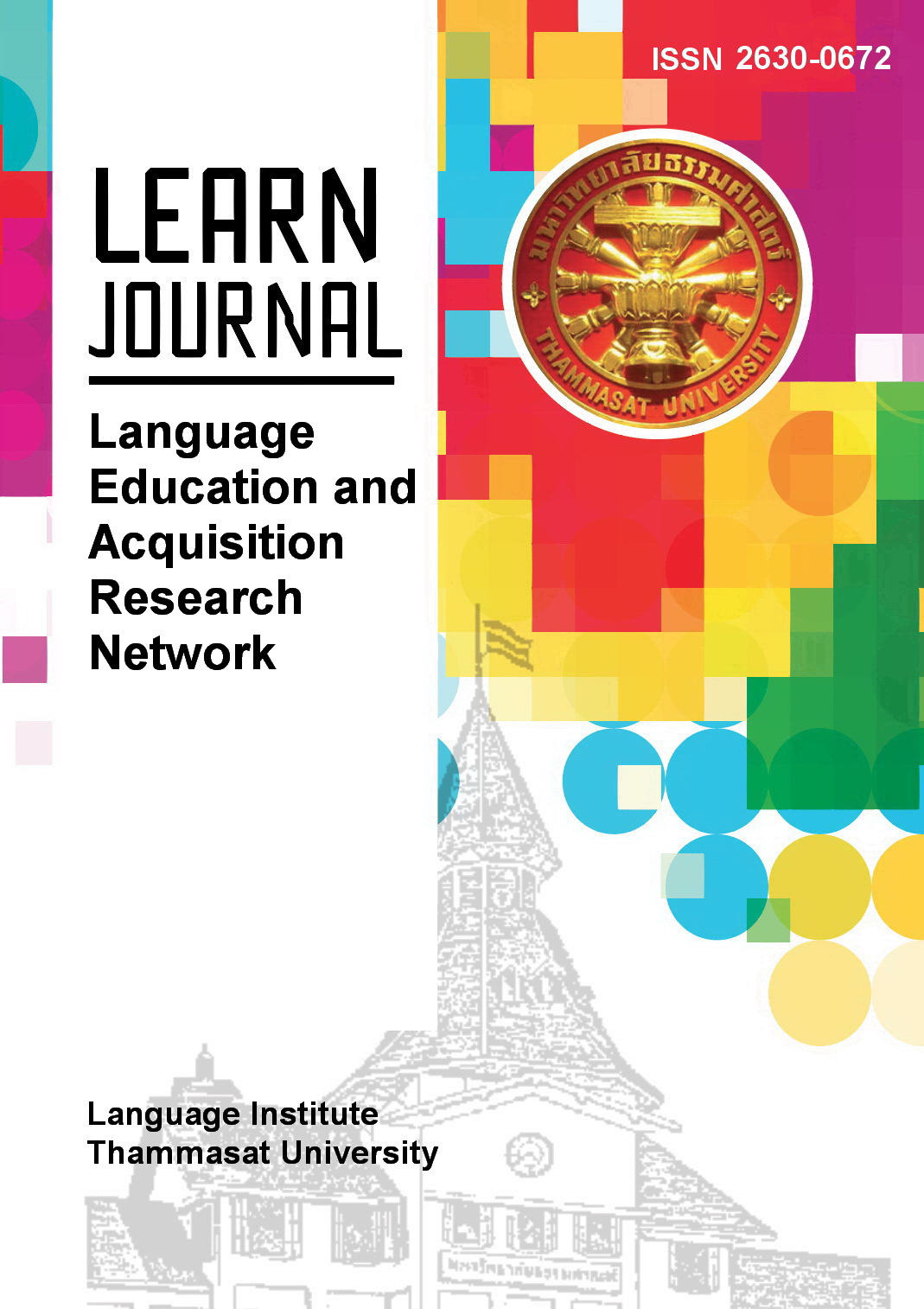Reactions of Teachers and Students Towards the Implementation of Performance-based Language Assessment: A Washback Study in Hokkaido, Japan
Main Article Content
Abstract
This qualitative study investigated the washback of performance-based assessment used by three English language teachers in Hokkaido, Japan, each of whom implemented their own course-specific assessments. The study employed qualitative research of an in-depth interview with 15 students and a self-reflective method from 3 teachers. Teachers demonstrated different approaches in implementing performance-based language assessment. However, they agreed that this type of assessment could enhance students' communicative skills and rubrics were crucial in the assessment process. In terms of washback on students, they found that performance-based assessment, with detailed feedback, provided learners with a comfortable and challenging learning environment, leading to self-developed English performances, feelings of accomplishment, and better retention of English used in the presentations. However, some students found performance-based assessment demanding, causing anxiety. The findings suggest that when implementing performance-based assessment teachers should consider different aspects of the assessment to create positive washback.
Article Details
References
Alderson, J., & Banerjee, J. (2001). Language testing and assessment (Part
I). Language Teaching, 34(4), 213-236. doi:10.1017/S0261444800014464
Alderson, J. C., Clapham, C., & Wall, D. (1995). Language test construction
and evaluation. Cambridge University Press.
Alderson, J. C., & Hamp-Lyons, L. (1996). TOEFL preparation courses: A
study of washback. Language Testing, 13(3), 280–297.
https://doi.org/10.1177/026553229601300304
Alderson, J. C., & Wall, D. (1993). Does washback exist? Applied
Linguistics, 14(2), 115-129. https://doi.org/10.1093/applin/14.2.115
Allen, D., & Tanner, K. (2017). Rubrics: Tools for making learning goals
and evaluation criteria explicit for both teachers and learners. Life Sciences Education, 5(3), 197-295. doi.org/10.1187/cbe.06-06-0168
Bachman, L. F., & Palmer, A. S. (1996). Language testing in practice.
Oxford University Press.
Bacquet, J. (2020). Implications of summative and formative assessment
in Japan – A review of the current literature. International Journal of Education and Literacy Studies, 8(2), 28-35. http://dx.doi.org/10.7575/aiac.ijels.v.8n.2p.28
Bailey, K. M. (1996). Working for washback: A review of the washback.
Language Testing, 13(3), 257-279.
https://doi.org/10.1177/026553229601300303
Black, P., & Wiliam, D. (1998). Assessment and classroom learning.
Assessment in Education, 5(1), 7-74. https://doi.org/10.1080/0969595980050102
Brown, J. D., & Hudson, T. (1998). The alternatives in language
assessment. TESOL Quarterly, 32(4), 653-675. https://doi.org/10.2307/3587999
Cheng, L. (2005). Changing language teaching through language testing:
A washback study. Cambridge University Press.
Corbin, J., & Strauss, A. (2008). Basics of qualitative research: Techniques
and procedures for developing grounded theory (3rd ed.). Sage.
Davies, A., Brown, A., Elder, C., Hill, K., Lumley, T., & McNamara, T.
(1999). Dictionary of language testing (Vol. 7). Cambridge University Press.
Hamp-Lyons, L., & Kroll, B. (1997). TOEFL 2000 - writing: Composition,
community, and assessment. Princeton, NJ: Educational Testing Service.
Huang, Y., & Gui, M. (2015). Articulating teachers' expectations afore:
Impact of rubrics on Chinese EFL Learners' self-assessment and speaking ability. Journal of Education and Training Studies, 3(3), 126-132. https://eric.ed.gov/?id=EJ1060996
Lynch, B. K. (2001). The ethical potential of alternative language
assessment. In C. Elder, A. Brown, E. Grove, K. Hill, N. Iwashita, T.
Lumley, T. McNamara & K. O'Loughlin (Eds.), Experimenting with
uncertainty: Language testing in honour of Alan Davies (Vol. 11, pp. 228-239). Cambridge University Press.
McNamara, T. (1996). Measuring second language performance. Addison
Wesley Longman Ltd.
McNamara, T. (2001). Rethinking alternative assessment. Language
Testing, 18(4), 329–332.
https://journals.sagepub.com/doi/pdf/10.1177/026553220101800401
Mertler, A. (2001). Designing scoring rubrics for your classroom. Practical
Assessment, Research & Evaluation, 7(25), 1-9.
https://doi.org/10.7275/gcy8-0w24
Sasaki, M. (2008). The 150-year history of English language assessment in
Japanese education. Language Testing, 25(1), 63–83. https://doi.org/10.1177/0265532207083745
Shohamy, E. (2007). Language tests as policy tools. Assessment in
Education, 14(1), 117-130.
https://doi.org/10.1080/09695940701272948
Stobart, G. (2003). Editorial: The impact of assessment: Intended and
unintended consequences. Assessment in Education, 10(2), 139-
https://doi.org/10.1080/0969594032000121243
Tsagari D., & Cheng L. (2017) Washback, impact, and consequences
revisited. In E. Shohamy E., I. Or, & S. May. (Eds.), Language testing and assessment. Encyclopedia of language and education (3rd ed.). Springer.
Turgut, F., & Kayaoglu, N. M. (2015). Using rubrics as an instructional tool
in EFL writing courses. Journal of Language and Linguistic Studies, 11(1), 47-58. https://dergipark.org.tr/en/pub/jlls/issue/36119/405585
Wall, D. (1997). Impact and washback in language testing. In C. Clapham
& D. Corson (Eds.), Encyclopedia of language and education (1st ed., Vol. 7, pp. 291-302). Kluwer Academic Publishers.
Wall, D. (2005). The impact of high-stakes examinations on classroom
teaching: A case study using insights from testing and innovation theory. Cambridge University Press.
Wall, D., & Alderson, J. C. (1993). Examining washback: The Sri Lanka
impact study. Language Testing, 10(1), 41-69.
https://doi.org/10.1177/026553229301000103
Wall, D., & Horák, T. (2006). The impact of changes in the TOEFL
examination on teaching and learning in Central and Eastern Europe. Phase I: The baseline study (TOEFL Monograph No. MS-34). Educational Testing Service.
Wall, D., & Horák, T. (2008). The impact of changes in the TOEFL
examination on teaching and learning in Central and Eastern
Europe. Phase 2: Coping with change (TOEFLiBT-05). Educational
Testing Service.
Watanabe, Y. (1996). Does grammar translation come from the entrance
examination? Preliminary findings from classroom-based research. Language Testing, 13(3), 318-333. https://doi.org/10.1177/026553229601300306
Wigglesworth, G. (2008). Task and performance-based assessment. In E.
Shohamy & N. H. Hornberger (Eds.), Encyclopedia of language and education (2nd ed., Vol. 7, pp. 111-122). Springer Science+Business Media.


